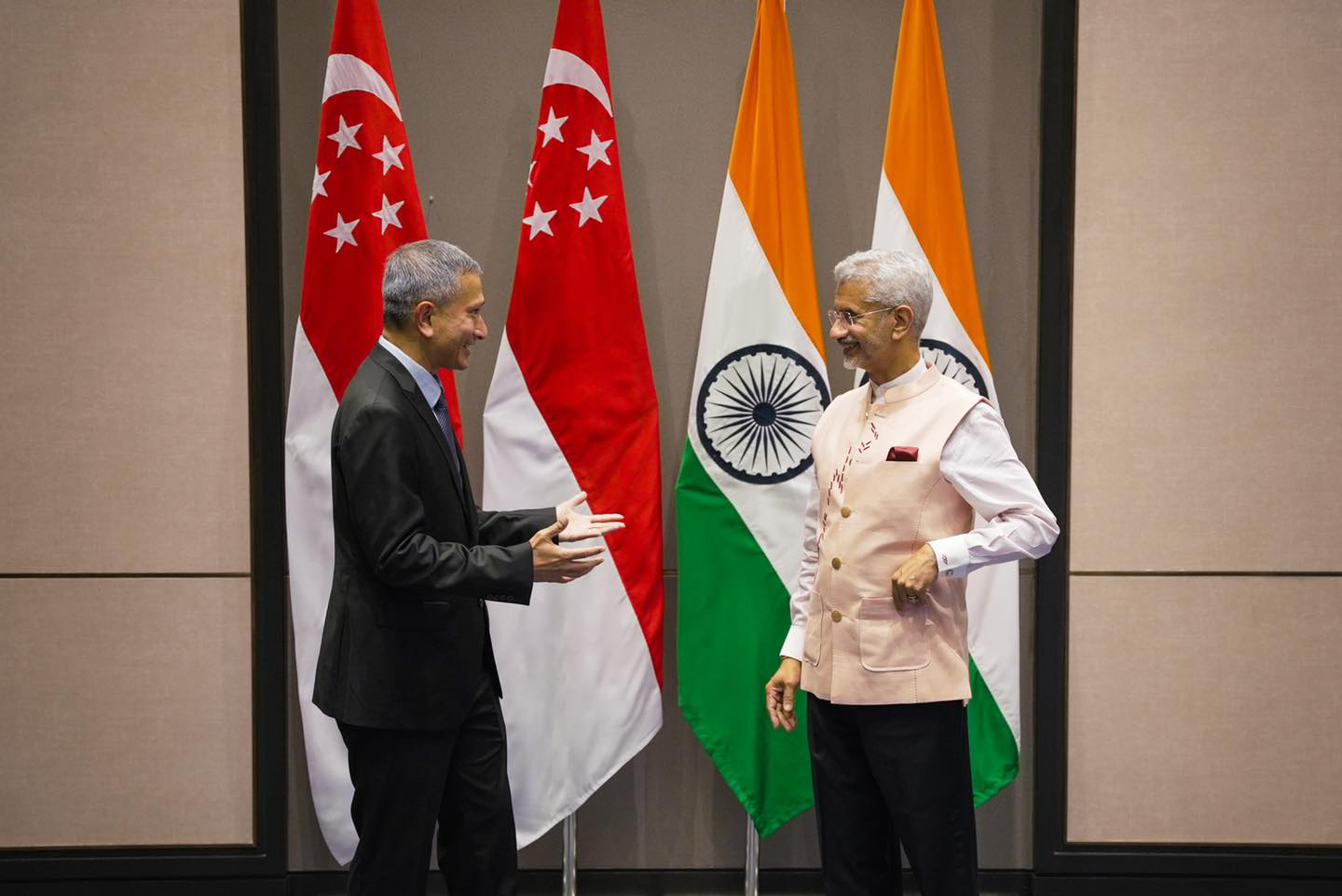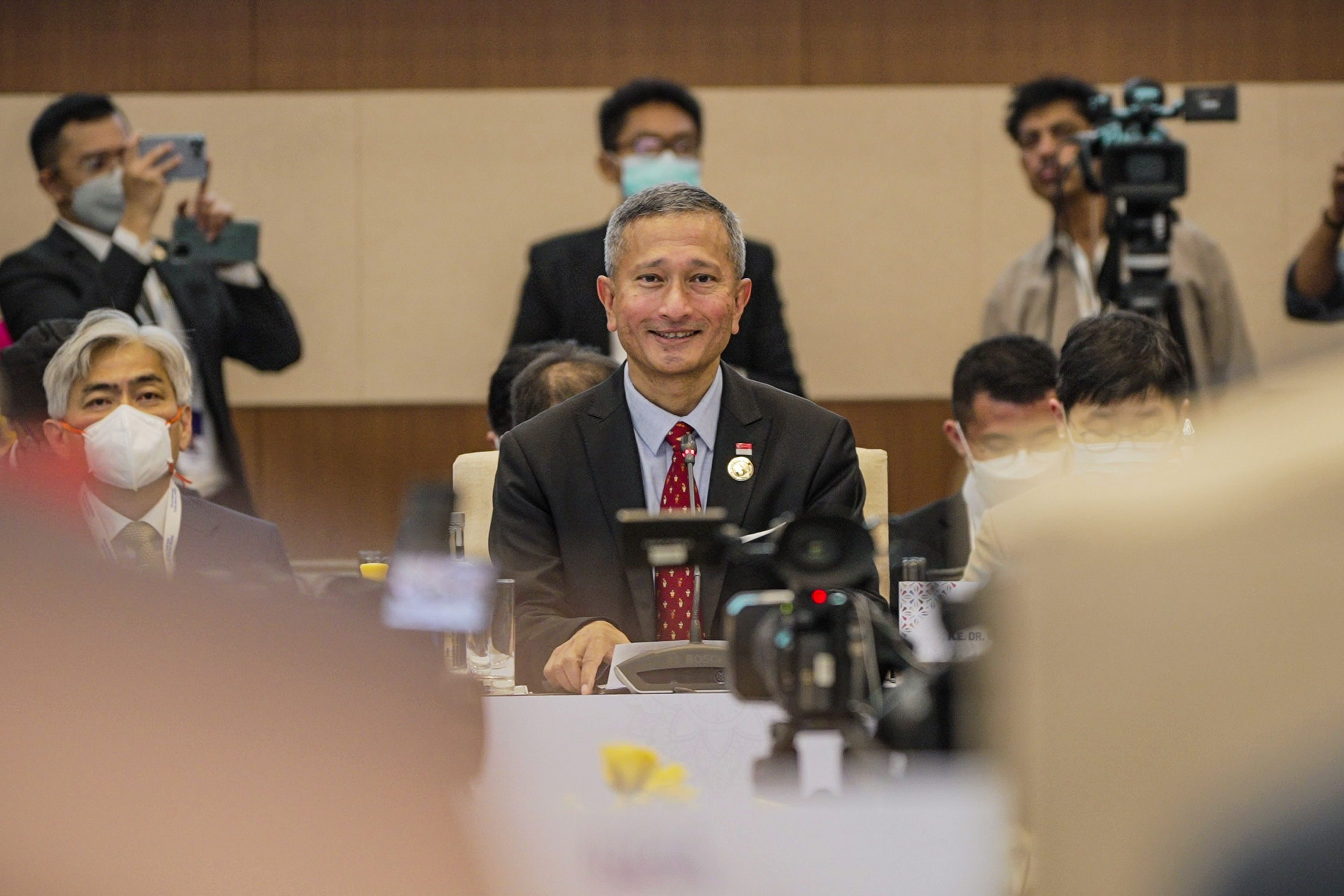India and Asean must build resilience to tackle challenges: Vivian Balakrishnan
Sign up now: Get ST's newsletters delivered to your inbox

Dr Vivian Balakrishnan meeting Indian External Affairs Minister, Dr S. Jaishankar, on June 15, 2022.
PHOTO: MFA
Follow topic:
KOLKATA - Asean nations and India rallied to one another's aid during the past two and a half years, and will emerge stronger from the Covid-19 pandemic as links between both regions are enhanced, said Singapore's Foreign Minister Vivian Balakrishnan on Thursday (June 16).
Speaking at the opening of the Special Asean-India Foreign Ministers' Meeting (SAIFMM) in New Delhi, he added it is crucial that both regions build resilience to tackle ongoing and future challenges.
"The sharpening superpower rivalry between the US and China has direct implications for all of us in Asia," he noted.
"These developments, if left unchecked, can threaten the old system of peace and stability which we have been dependent on for the basis of our growth, development and prosperity over many decades."
The minister co-chaired Thursday's meeting - hosted by India to mark the 30th anniversary of its dialogue relations with Asean - with Indian External Affairs Minister, Dr S. Jaishankar.
Speaking virtually to the media later in the day, Dr Balakrishnan said focus areas for the multilateral partnership include sustainable development and infrastructure development, especially in areas that enhance both physical and digital connectivity between India and Asean.
Dr Balakrishan highlighted ongoing plans to link Singapore's PayNow and India's Unified Payments Interface real-time payment systems. This will enable convenient, low-cost fund transfers directly between bank accounts in both countries.
"Imagine if we could do that on an Asean-wide scale… it would facilitate businesses, it would increase opportunities for manufacturers across a much larger market," he said, noting that the Asean countries and India accounted for a population of more than two billion and a combined gross domestic product of nearly US$6 trillion (S$8.3 trillion).
India and Singapore enjoy "excellent" ties, Dr Balakrishnan added, noting that trade between both nations improved despite the pandemic.
In 2021, India's exports to Singapore went up 30 per cent from the previous year, while Singapore was India's largest foreign direct investment (FDI) partner, accounting for 27 per cent of the South Asian nation's record-high US$83.6 billion annual FDI inflow in 2021-22.
"India is an economy which is maturing quickly, leapfrogging, taking advantage of digital opportunities... We need to watch (it) closely and look for opportunities to invest and collaborate in," he said, noting how sectors such as the digital economy as well as green sustainable development offer Singapore companies numerous opportunities.
Dr Balakrishnan dispelled the argument by some analysts that New Delhi's active role in the Quad and the Indo-Pacific Economic Framework risks undermining Asean's relevance for India and make it less important for the country's strategic engagement in the region.
Responding to a question on this from The Straits Times, he said: "India has strategic interests not just in the Indian Ocean, but across into the Asia-Pacific as well. And because Asean is right in the middle of it, Asean matters even more to India."
Citing abundant opportunities for India and South-east Asia to integrate their economies in sectors such as digital space and green technologies, he stressed: "I am convinced - and it's not just my view, but I am reflecting the view of the Indian government - that Asean matters even more to India."
India's trade with Asean states reached US$96.8 billion in 2018-19, but has fallen since to US$78.9 billion in 2020-21, largely due to pandemic-related disruptions.

Dr Vivian Balakrishnan delivers opening remarks at the Special Asean-India Foreign Ministers’ Meeting, in New Delhi, on June 16, 2022
PHOTO: MFA
Dr Balakrishnan also said he looked forward to India, which is the world's largest rice exporter, exporting more food to South-east Asia and beyond following a hopefully good post-monsoon harvest, to help mitigate the destabilising impact that the Russian invasion of Ukraine has had on global food supply and prices.
"This is again a situation where a crisis presents both a challenge and an opportunity… The more India and Asean can interconnect, engage, lower trade barriers, lower non-tariff barriers and facilitate the flow of goods and services, the better for all of us," he added.
Ministers at the meeting also emphasised the need for the early completion and operationalisation of the India-Myanmar-Thailand Trilateral Highway, and expressed hopes for its eastward extension to Lao PDR, Cambodia and Vietnam.
Myanmar, which has been in conflict since the military seized power from the elected government of Aung San Suu Kyi last year, remained unrepresented at the foreign ministers' meeting in New Delhi.
This is in keeping with the Asean view that Myanmar will continue to be represented at a non-political level unless there is progress on the "five-point consensus" - a peace plan - arrived at by Asean leaders last year.
Dr Balakrishnan noted there has not been any significant progress on the five-point consensus. "Unfortunately, it looks like the situation there is not any better. We still get reports of violence, of economic stagnation, in fact, of economic regression. And there is really no concerted, sincere, open-hearted attempts at dialogue and political reconciliation," he added.

